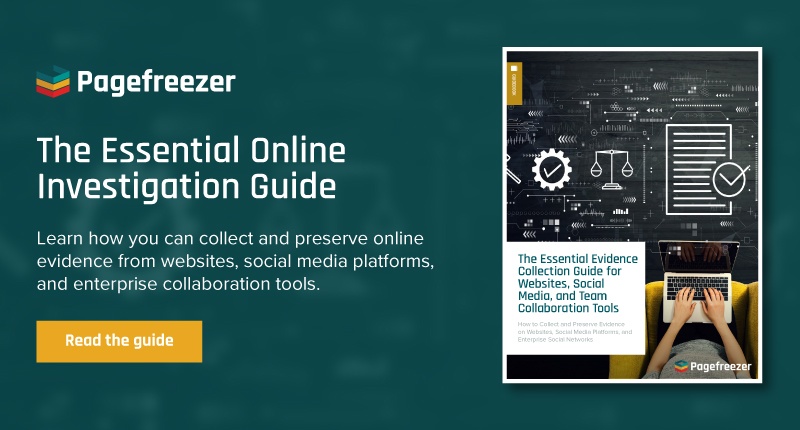Since the beginning of social media, people from all over have been able to share their thoughts and ideas. The dark side of this revolutionary change is that not everyone has something kind to say, which makes protecting yourself against social media harassment critical.
Even the rich and famous aren’t immune from this epidemic of online bullying in the digital world. In fact, because they are so visible (and because of social media, so accessible), they are particularly popular targets for cyberbullying and harassment.
This blog looks at ten ways to protect yourself from social media abuse and harassment and how Pagefreezer can help.
Top Ways to Protect Yourself from Social Media Abuse and Harassment
The internet is a vast and ever-growing place, making it easy to fall victim to social media abuse and harassment. Here are ten ways to protect yourself from social media abuse and harassment.
1. Turn On Privacy Settings
One of the best and easiest ways to prevent social media harassment is by simply turning on your privacy settings. Almost all social media platforms can control how a profile appears to other users. For example, whether profile pictures and posts are made public or private.
Ultimately, a private profile provides better security against stopping any would-be cyberbullies in their tracks. For any Instagram users, there’s a step-by-step guide on how to set an Instagram from public to private; for additional information, read more here.
2. Safeguard All Passwords
Some scenarios around social media harassment do not involve loud bullying and shaming. Some cyberbullies work more discretely and try to obtain their victim's passwords to access their accounts in hopes of using an account to commit fraud or cause chaos. Safeguarding all passwords is critical; one of the best tools to manage them is LastPass, a digital vault that keeps all login information secure.
3. Record Every Interaction
A great strategy to deal with social media harassment is to record every interaction and conversation. By capturing detailed records related to social media bullying, identifying those responsible and holding them accountable becomes much easier.
With indisputable evidence, it's more likely that there'll be severe consequences once the authorities get involved. In cases where it’s essential to authenticate information, try using WebPreserver by Pagefreezer, which saves and preserves all online evidence in two easy clicks.
4. Avoid Responding
This tip can be hard to follow in the heat of the moment, but it's crucial to remember. Ignoring a bully and refusing to respond can be the difference between escalating an already dangerous situation or staying safe. The truth is that even the simplest of responses can be the spark that draws the harasser to continue their attacks. In the end, such an emotional war on social media can result in sharing hurtful insults, leading only to regret.
5. Don't Be Afraid to Block Abusers
In cases where a situation rapidly escalates, blocking that person can be a good idea. With just a few clicks, blocking a bully can quickly halt their access to your account activity and stop further harassment. Luckily, most social media platforms follow the same method when blocking someone: Press the three dots in the person's profile and press block. In addition, there are great anti-harassment tools, like Block Party, that make it easy to block large numbers of trolls and filter out unwanted mentions.
6. Report Cyberbullying
Social media bullying can take multiple forms. For example, TikTok, the social media video platform, has a comprehensive set of community guidelines to help identify and prevent cyberbullying and hateful behavior. In cases of social media harassment, it's a wise decision to document every interaction and then report those findings to the platform moderators.
7. Carefully Screen All Friend Requests
As the world becomes engulfed in social media, it's become increasingly common to send friend and follower requests to just about anybody. It's critical, however, to thoroughly screen and check all friend/follower requests before accepting them. Do you know this individual personally? Are you comfortable with them seeing everything you post on social media? And if you do know the person, are you sure it's a legitimate request and not a hacked or fake account that's been designed to gain access to your information?
8. Pause a Moment Before Posting
Before posting anything online, no matter how trivial, it pays to take a moment to reflect and carefully consider if this is something that should be shared with the world. Many people rely on social media as a medium for human connection, so it can be all too easy to overshare and reveal sensitive information. Bits and pieces of personal information that are shared online can, over time, provide a surprisingly accurate picture of your daily life and habits—which can fuel trolls and even put your physical safety at risk.
9. Get a Lawyer
Before making any rash decision, it's wise to consult a lawyer on how to proceed. For some situations, finding a qualified lawyer to help answer any questions and advise on how to proceed might be the next best course of action. In cases of social media defamation, a lawyer can share expert insight on what to do next, along with what type of evidence to gather if heading to court is a real possibility.
10. Contact Local Law Enforcement
Lastly, if a situation gets out of hand, call local law enforcement immediately and let them handle it. In other circumstances that are less intense, it might be necessary to find a solution with the help of school administrators, mediators, or website moderators. However, it's important to note that threats of violence aren't something to brush off; such extreme cases should immediately involve the police.
Some Final Thoughts on Protecting Yourself
It's important to state that there's no easy fix when preventing social media abuse, but there are tips that can help handle difficult situations. Many people think of cyberbullying and bullying as a phenomenon restricted to only teenagers and children. It isn't.
One of the best ways to actively prevent social media abuse and cyberbullying is to spread awareness of it. Being vocal when you spot harassers and trolls online is a way to help ensure that abuse is addressed and shut down.
Collecting Online Evidence? Don't Let Screenshots Sink Your Case
In today's world full of online communication, evidence collection has never been more critical. For anyone left wondering how to collect online evidence, check out our Essential Online Investigation Guide below.









